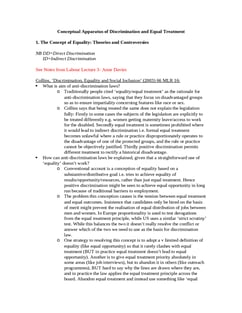Judgement for the case ASLEF v UK
Table Of Contents
L was a member of ASLEF, a union with the object of promoting equal treatment at work regardless of sex, race, etc. L stood as a councilor for the BNP, harassed equality campaigners and wrote articles attacking other races, women etc.
He successfully sued ASLEF under s.174, the employment tribunal finding that he had been sacked primarily because of his membership of the BNP (i.e. membership of a political party) which was prohibited under s.174.
ECtHR held that this breached ASLEF’s freedom of association under Article 11.
Judgment
Article11 was designed to prevent interference by the state with the right to form and join trade unions except where 11(2) provided (i.e. in accordance with law and necessary in a democratic society).
Prima facie, therefore, unions enjoy freedom to set their own membership criteria.
Article 11 cannot be interpreted as imposing an obligation on associations or organisations to admit whosoever wishes to join. Where associations are formed by people, who, espousing particular values or ideals, intend to pursue common goals, it would run counter to the very effectiveness of the freedom at stake if they had no control over their membership.
-
In this case there was an interference that didn’t strike a proportionate balance: There was no closed shop agreement, so L was still free to work.
His freedom of expression was not curtailed by the expulsion (in a substantive sense it was: He suffered the penalty of no union protection as a result of his political beliefs);
ASLEF still collectively bargains on behalf of all workers in the bargaining unit regardless of members;
s.174 could have an enormous impact on unions because they have always traditionally been associated to a political party and admitting people with opposite views would undermine that support (why?).
The ECtHR rejects the argument that ASLEF could have ejected L because of his actions rather than party affiliations as unreasonable (why?)
For Further Study on ASLEF v UK
Need instant answers? Our AI exam tutor is here to help.
Ask questions 🙋 Get answers 📔 It's simple 👁️👄👁️
Our AI is educated by the highest scoring students across all subjects and schools. Join hundreds of your peers today.
Get StartedSimilar Cases
Related Product Samples
These product samples contain the same concepts we cover in this case.
| Labour Law | Freedom Of Association Notes (13 pages) |
| Labour Law | Freedom Of Association Notes (23 pages) |
| Labour Law | Freedom Of Association And Strikes Notes (8 pages) |
| Labour Law | Industrial Action Notes (19 pages) |

 Since 2010, Oxbridge Notes has been a trusted education marketplace, supplying high-quality materials from top achievers at universities like Oxford, Cambridge, LSE, Harvard, and Yale.
Since 2010, Oxbridge Notes has been a trusted education marketplace, supplying high-quality materials from top achievers at universities like Oxford, Cambridge, LSE, Harvard, and Yale.